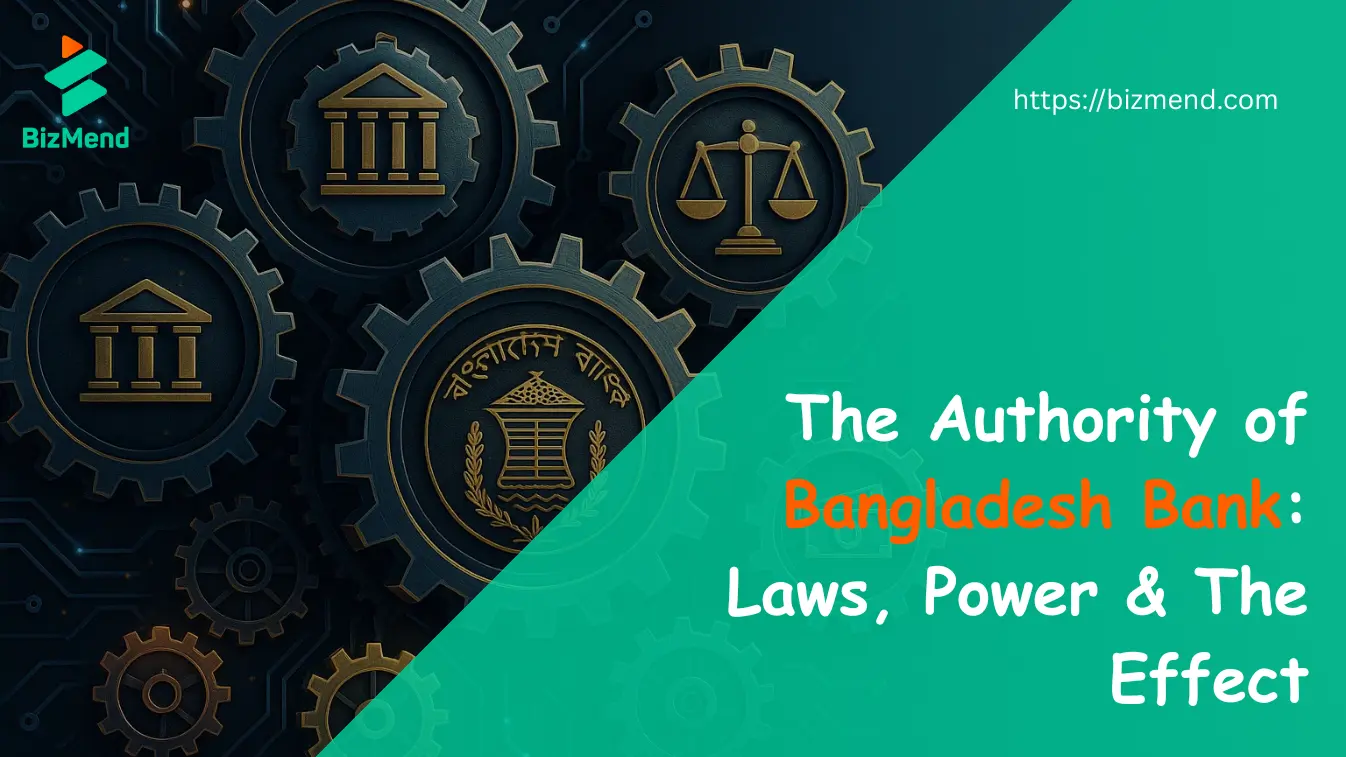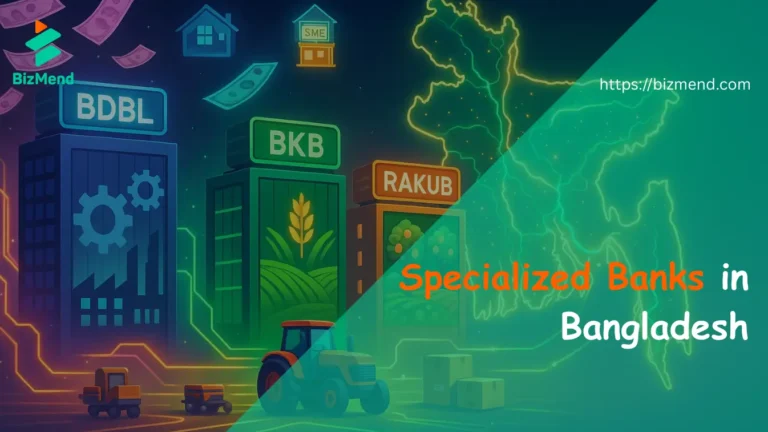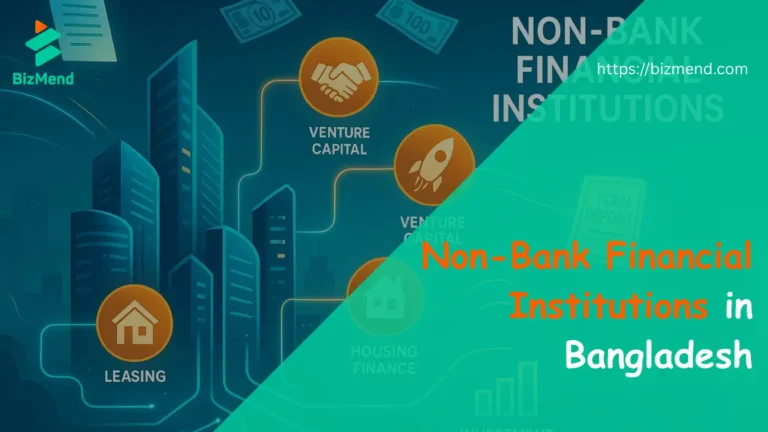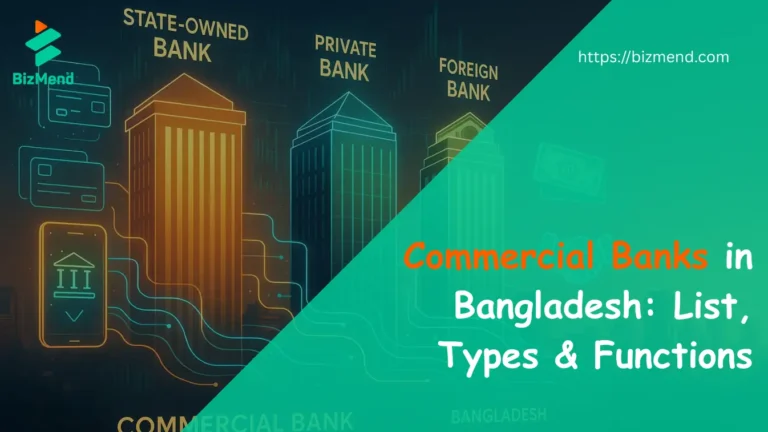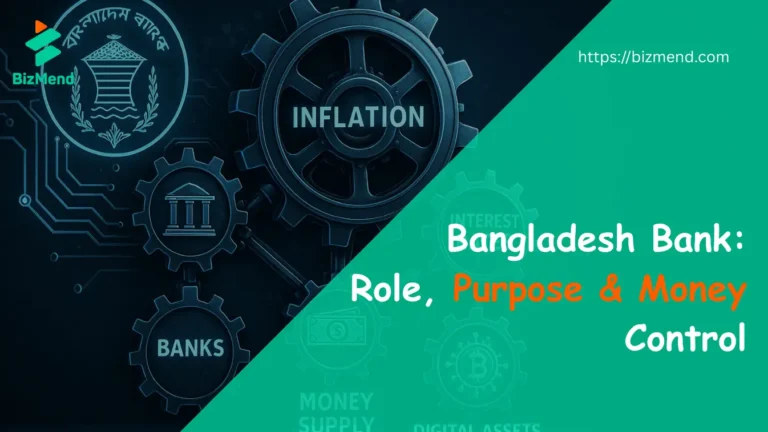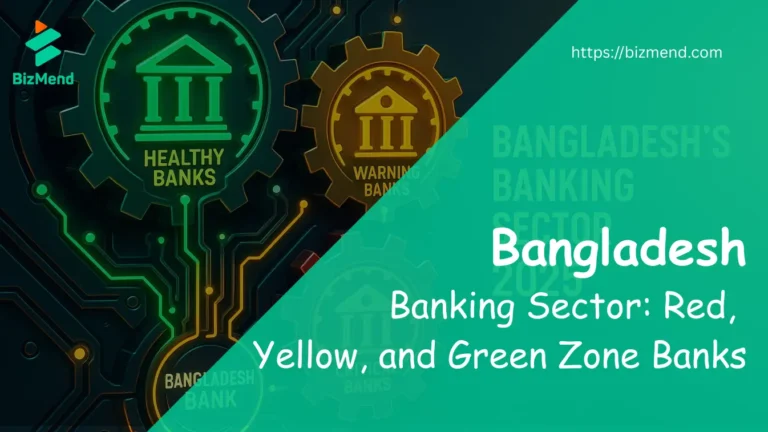Your bank just froze withdrawals and dropped a surprise merger—sounds like a bad drama, right? Luckily, the Authority of Bangladesh Bank is the strict parent that says “enough,” keeping your cash safe while disciplining the troublemaking banks.
If you’ve been reading about red zone banks, overnight bank mergers, or BB freezing suspicious transactions, and you’re wondering how a regulator has that kind of teeth, this blog will explain that, without drowning you in legal codes.
We’re going to talk about purpose, power, people, and perception: the core 4Ps of why Bangladesh Bank doesn’t just watch from the sidelines, but whistles, intervenes, and occasionally pulls the plug.
First Things First: Where Does BB Get Its Power?
You won’t find Bangladesh Bank flexing like a political ministry. But it holds legal power stronger than most. That power comes from two cornerstones:
- The Bangladesh Bank Order, 1972: This Order established BB as the central bank and gave it full authority to regulate the monetary system, issue currency, manage foreign reserves, and oversee banks.
- The Bank Company Act, 1991 (amended 2013 & 2023): This Act gives Bangladesh Bank the power to:
- Set rules for banking operations
- Classify banks by risk
- Appoint observers in failing banks
- Force mergers
- Revoke licenses
- Investigate fraud or mismanagement
So, no, it’s not “just another government office.” It’s the legal firewall between you and a full-blown financial mess.
BB’s Zone System: Red, Yellow, Green, What’s That?
When Bangladesh Bank started classifying banks into risk zones, many thought it was about public shaming. But that’s not the point.
Here’s what these zones actually mean:
Red Zone
These banks are at serious risk of collapse. BB finds signs like:
- High defaulted loans (NPLs)
- Capital shortfall
- Failure to meet CRR/SLR
- Poor governance or internal fraud
- Inability to pay depositors
Real Example (2024–2025):
According to recent reports, banks like Bangladesh Commerce Bank and AB Bank fell into this category.
Yellow Zone
These banks are not failing, but at risk if problems continue. Think of this as BB putting them “under observation.”
Green Zone
Banks with strong performance, low NPLs, high reserves, and healthy governance fall here. Think City Bank, BRAC Bank, and EBL.
Bangladesh Bank monitors these zones regularly. It publishes periodic reports and often engages directly with the board of red-zone banks.
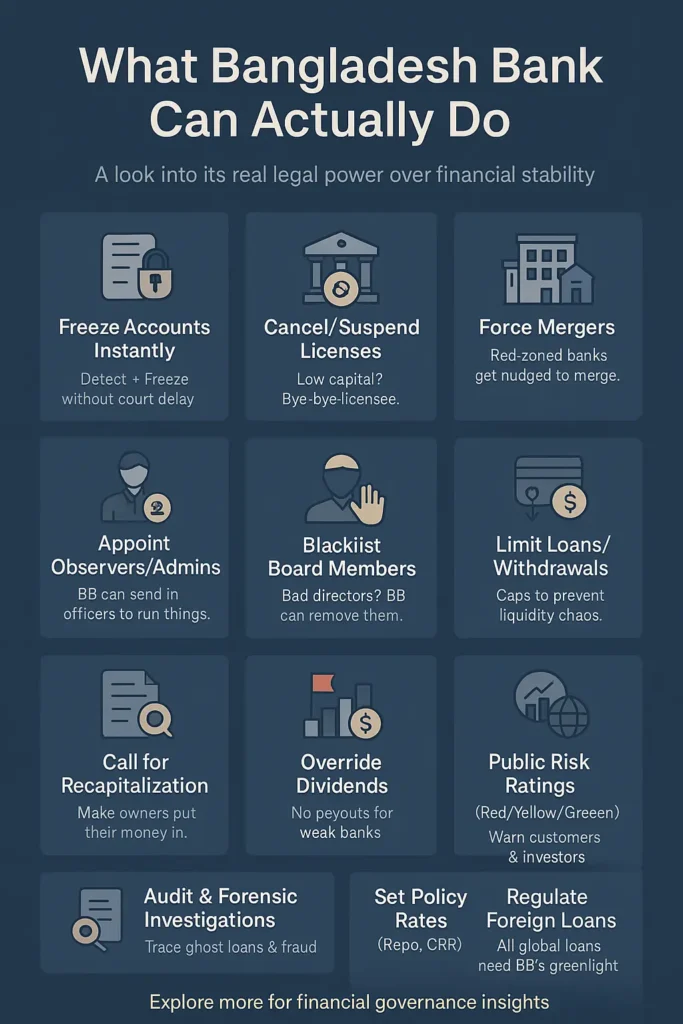
Real Enforcement Power: What Bangladesh Bank Can Actually Do
Bangladesh Bank isn’t just writing memos; it has real teeth when it comes to fixing the financial system.
Here’s what it can legally do:
- Freeze Accounts Instantly
Suspicious or unusual activity? BB’s BFIU (Bangladesh Financial Intelligence Unit) can step in immediately to freeze personal or corporate accounts without waiting for a court verdict.
- Cancel or Suspend Bank Licenses
If a bank’s capital reserve falls below critical levels or if it repeatedly violates loan policies, BB can revoke or temporarily suspend its license to operate.
- Force Mergers
BB proposed bank merger guidelines in 2024 to reduce systemic risk. Red-zoned banks have been nudged into mergers to avoid collapses and depositor panic.
- Appoint Observers or Administrators
BB has the authority to place internal officers inside a bank, either to monitor, take over management, or ensure compliance during a crisis.
- Limit Loans or Withdrawals
When liquidity dips dangerously low, BB can step in and cap how much money a bank can lend, or even how much a customer can withdraw, protecting from a run-on-the-bank scenario.
- Call for Recapitalization
Shareholders or parent companies can be instructed to inject more funds or exit entirely. This is especially active in BB’s oversight of failing private banks.
- Audit & Forensic Investigations
Through BFIU (Bangladesh Financial Intelligence Unit) and its own audit arms, BB can order internal forensic reviews to trace fraud, ghost loans, or politically backed defaults.
- Impose Lending Restrictions by Sector
BB can restrict lending to risky sectors, real estate, heavy industry, and unsecured consumer credit, depending on economic signals or previous abuse.
- Set Policy Rates & Lending Rules
All scheduled banks must comply with BB’s latest repo, reverse repo, CRR, and SLR directives; failure means direct penalties or loan disqualification.
- Blacklist or Penalize Board Members
BB can recommend the removal of specific directors or senior management if found involved in irregularities, collusion, or deliberate misreporting.
- Announce Public Risk Ratings
Green, Yellow, and Red Zone classifications publicly alert both customers and shareholders about the financial health of a bank; this pressure alone can shift market sentiment.
- Regulate Foreign Loan Approvals
No foreign currency loan, repatriation, or guarantee can go through without BB approval. This is vital for startups and international businesses setting up in BEZA or Hi-Tech Parks.
- Override Dividend Declarations
BB can stop a bank from paying dividends if it is capital-weak or has classified loans. This keeps money available for restructuring instead.
And while BB works in sync with the Ministry of Finance, it doesn’t need ministerial approval for these steps. Its power is baked into the law.
Real-World Examples: When BB Strikes
Let’s not speak in hypotheticals.
Here’s how the authority of Bangladesh Bank was gained :
- Padma Bank: Once in hot water due to massive loan fraud. BB stepped in, installed management changes, and put withdrawal caps. Still struggling.
- ICB Islamic Bank: Labeled high-risk due to continued losses. BB restricted lending and blocked expansion.
- National Bank Limited (NBL): Repeated liquidity issues and governance red flags. BB monitored closely, restricted fresh lending, and now demanding recovery plans.
- AB Bank: Forced restructuring and continuous compliance audits over risky loan exposure.
Each of these actions followed internal assessments under the Bank Company Act and BB’s Risk-Based Supervision Framework.
Why These Powers Matter: Bangladesh Bank’s Job in a Crisis
Bangladesh Bank is the referee between public confidence and financial chaos.
Picture this: a bank goes belly-up. People panic. Withdrawals spike. Other banks start wobbling too. That’s a systemic risk, and BB’s job is to stop it from spreading.
During the 2023 liquidity scare, BB stepped in with liquidity support for a few banks. During 2024, BB pushed at least 4 banks toward merger discussions, aiming to shield depositors and the market from wider shocks.
It’s also why BB tracks:
- Loan defaulters
- Trade-based money laundering
- Irregularities in loan provisioning
- Fraudulent mobile financial transactions
Whether you’re a salary-earner watching inflation or a foreigner trying to start a business, the policies BB enforces protect your wallet.
Risk Zones & the Foreign Business Angle
If you’re a foreign entrepreneur, here’s why you should care:
- Opening a business account?
Check if your preferred bank to open a business account is in the green or yellow zone. Banks in the red might struggle with document processing, FX conversion, or remittance flows.
- Getting a startup loan or lease approval?
BB’s zoning influences which banks will actively lend or comply with BIDA-linked clearance. (Great add-on when discussing things like startup loans or office space lease requirements.)
- Using digital wallets or banking APIs?
BB regulates these licenses and ensures only trusted players operate in this space.
Final Thought: Power Isn’t Always Loud
You may never hear BB speak in a press briefing. But its pen decides which bank thrives, merges, or quietly folds. It’s not political, it’s structural.
BB’s power is quiet, legal, and absolutely necessary. It doesn’t “choose winners.” It weeds out risks.
And for those of us working, saving, investing, or building something real in this country, that watchdog role isn’t interference; it’s survival.
“Regulators are the brakes in a system with no seatbelt.”
FAQ
Why does the Bangladesh Bank get to decide which banks are in the red, yellow, or green zones?
Answer: Because it’s not just a spectator; it’s the referee. BB reviews a bank’s financial health through Capital adequacy, Asset quality, Management capability, Earnings, Liquidity, and Sensitivity (what experts call “CAMELS” rating). If a bank is playing too risky, like dishing out shady loans or failing to recover them, BB steps in. Red zone means: “Fix your act, or you’ll be fixed by us.”
Can Bangladesh Bank really force two banks to merge?
Answer: Yes, and it already has. BB holds this power under the Bank Company Act, 1991, especially when a bank poses a systemic risk to depositors or the economy. The recent wave of forced mergers among weaker private banks is a direct example. It’s not done on a whim; there’s a long paper trail, audit reports, and sometimes, a lifeline from stronger banks.
What gives BB the legal authority to freeze someone’s bank account?
Answer: That power comes from the Bangladesh Bank Order, 1972, the Foreign Exchange Regulation Act, and the Money Laundering Prevention Act. If there’s suspicion of fraud, terrorist financing, or large unexplained transactions, BB doesn’t need to wait for court permission; it can issue a temporary freeze to protect the public interest. It’s part of their watchdog job.
Is Bangladesh Bank connected to government politics?
Answer: It’s tied to government policy, not daily politics. BB works closely with the Ministry of Finance, but it operates independently under its own legal mandate. The Governor is appointed by the government, yes, but cannot be fired based on political moods. This balance keeps BB focused on economic reality, not election drama.
What happens to a red-zoned bank’s customers?
Answer: They don’t lose their money overnight, but BB may limit large withdrawals, restrict new loans, or appoint observers. In the worst-case scenario, the bank may be merged or dissolved. BB’s job is to make that transition as shock-free as possible, to keep your paycheck or business capital from suddenly vanishing.


